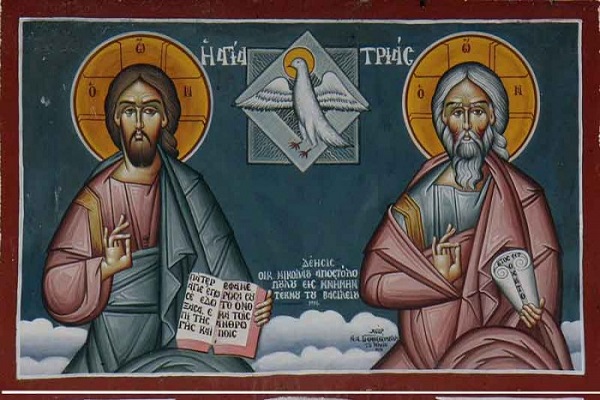The Church, Christ, the Holy Spirit and Us
2 Ιουνίου 2018
1. The period before Easter, which the Church calls Great Lent, culminating in Great Week, is a time of struggle against sin and the contrary spirit. It’s an education in dying to whatever estranges us from ourselves, our neighbours, the whole of creation and, in the end, God. And if this happens, that is if we strive as the Church instructs us, then we find our heart, which, by itself, has the sense of God. From this sense also flows our feelings towards our neighbour, ourselves and the rest of creation. This learning process is painful. It’s being buried with Christ and is carried out for the gift of the greater resurrection which Christ has promised and given us.

2. On the Sunday of the resurrection, we experience an explosion of joy. We live through a festal triumph of love. Because life has defeated death. Christ has defeated Hades, destroyed its dominion and has risen from the dead as God and Man. And since Christ performed all this as both God and human person, it’s clear that, with Him, with His own Resurrection, He also raised the human person incorporated into Him, all persons who had previously been subject to death. In other words, we were raised with Him, having walked with Him along the path to His passion and the cross.
Even though we were raised, however, we had not yet become what we were destined to be. Christ had not been formed within us. Something was missing. Or rather someone who would form Christ within us was missing. Someone who would depict, engrave Christ within us and in our whole existence. Remember the words of Paul: ‘My children, for whom I am again in pain until Christ is formed within you’ (Gal. 4, 19). This is why, as members of the body of Christ, on the basis of His Resurrection, we can look forward to Him Who, at Christ’s command, will form Him within us. And this is none other than the Comforter. For this reason,
3. Immediately after Easter Sunday, a new period opens in the liturgical life of the Church. A new phase in the process of our sanctification. If the time of Great Lent was a period of learning through ascesis, this new period is one of learning through hope. It’s an education which cultivates in the faithful the longing for the Holy Spirit. For the other Comforter. This means that for the whole of the period of the Pentecostarion, (from Easter until Pentecost) we long for our thirst to be slaked by the waters of piety. Remember: ‘At the mid-point of the feast, drench my thirsting soul in the waters of piety’. The waters of piety are nothing other than the gift of the Holy Spirit. So from the whole of the period from Easter until Pentecost, through its Gospel and Epistle readings and its hymnography, the Church creates the longing for the reception of the Holy Spirit. The Holy Spirit Who will make the consequences of the Lord’s Resurrection active, tangible and controllable. He will warm our heart, illumine our mind, and He will join us eternally to Christ.
We’ve been celebrating the coming of the Spirit since the Sunday of Pentecost. From the evening of that day (according to the custom of our Church after any redemptive event, we honour the person who played a leading role therein) we’ve concentrated our attention on Him. Who is equal in honour to the Father and the Son. Who is worshipped and praised together with the Father and the Son. Who is the desire of the faithful. Who is present now, since Pentecost. In any case, Christ, the incontestable Teacher and Provider promised this. He said: ‘I shall not leave you orphans’ (Jn. 14, 18), just before He departed from His anguished disciples.





